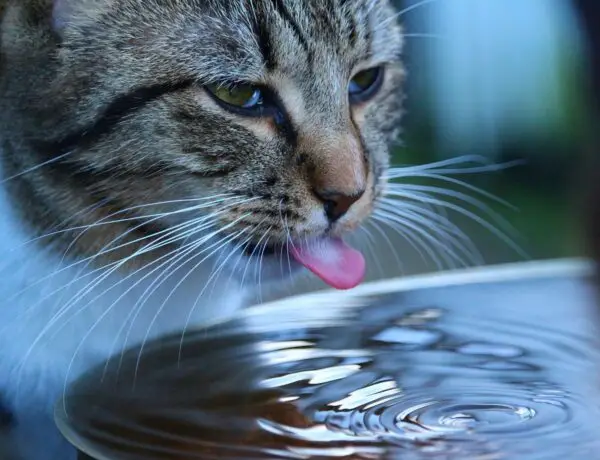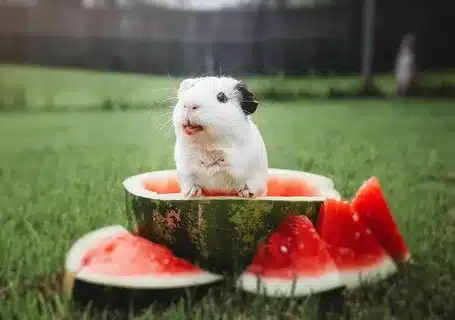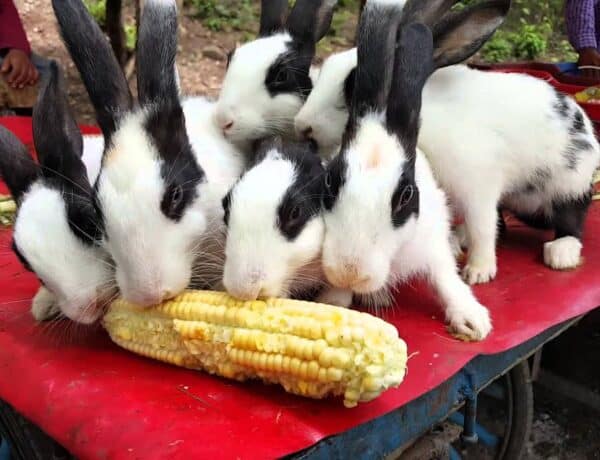Hay should be the main serving of many small animal’s diets such as rabbits, guinea pigs, degus and more, playing a vital role in promoting their overall health and well-being.
As a loving pet parent, understanding the significance of hay and its various types is one of the first things you should do to ensure you are providing optimal nutrition and enrichment for your small pets.
What Is Hay?
Hay is a dried forage made from grasses or legumes that are cut, dried, and baled for storage and consumption.
It serves as a primary source of fibre, protein and other essential nutrients for small animals like rabbits, guinea pigs, chinchillas, and degus. Hay for domesticated small pets, is our way of replicating the diet that these animals would have access to in the wild.
What About Long Stem Hay?
Long-stem hay plays a pivotal role in ensuring the well-being of rabbits and other small animals.
Its significance lies in promoting dental, digestive and gut health, while also ensuring that your little pet can engage in natural foraging behaviour keeping them happy and enriched too.
As advocated by experts such as the The Rabbit Welfare Association and Fund in the UK, incorporating high-quality hay into the diet of these animals is essential in allowing them to live a happy and hoppy life.
Why Is It Called Long Stem Hay?
Long stem hay refers to the length of the stem in forage, which is ever so important for maintaining dental health and digestive functions in small animals.
When choosing your long stem heavy, the long stem hay experts at HayDay say,
“The key to maintaining healthy teeth for your rabbit starts with ensuring adequate and appropriate fibre provision. Forage (grass and/or hay) should represent most of your rabbit’s diet (~80%) to maintain healthy digestive and dental function. Insoluble fibre is key to helping to promote healthy teeth and tummies and is contained within the coarser parts of a plant. While rabbits may naturally seek out less mature (more palatable!) fresh grass, some stemmy forage in the ration is essential (ideally around 20% of their fibre intake)”.
Varieties of Long Stem Hay at HayDay
Tasty Timothy Hay
Ideal for rabbits, guinea pigs, and other small animals, Tasty Timothy hay boasts naturally coarse, long stems that aid in digestion and dental health. This high-quality, barn dried hay is rich in fibre, protein and free from dust, ensuring a nutritious choice for furry companions.
Tasty Timothy Hay is FEMAs accredited too, to ensure guaranteed high quality each time.
Moreish Meadow Hay
Suitable for even the pickiest eaters, Moreish Meadow hay combines soft and palatable stems with high fibre content, supporting your small pet’s gut health.
Its versatility as a feeding hay extends to serving as a comfortable bedding option too for your rabbits, guinea pigs and other small animals.
Moreish Meadow Hay is FEMAs accredited so you can rest assured it is a guaranteed high quality hay.
Myths Busted
Contrary to common misconceptions, long stem hay is not exclusive to just Timothy Hay. If your hay supplier uses traditional farming techniques, whilst also investing in the best technology (such as barn drying facilities) then Timothy Hay and Meadow Hay can both be long stem cuts of grass, catering to the diverse needs of your small animals.
What are the Main Benefits of Feeding Long Stem Hay?
Dental Health
The naturally coarse stems in long stem hay facilitate healthy dental function by encouraging chewing. As small animal’s teeth grow continuously, a premium forage choice ensures that their teeth are worn down properly, preventing issues such as overgrowth which would cause pain and discomfort.
Gut Health
The insoluble fibre found in long stem hay aids in maintaining healthy gut movement (i.e. helping your small animal pass regular, and healthy poop). High fibre, long stem hay also helps promote regular digestion and prevents your small animal from entering the early stages of GI Stasis.
Quality Hay
Ensure that the majority of your small animal’s diet consists of high-quality hay to promote optimal health. Quality hay is reflected not only in its nutritional value but also in the amount of waste.
Waste will typically be reduced if a suitable quality, taste and texture is provided as the primary forage choice for your small pet.
Reduced Waste
Feeding suitable quality and different varieties of hay, can significantly reduce waste. Additionally, proper presentation of hay, using methods like hay racks or hay feeders, will enhance consumption and enrich their environment while minimizing the risk of contamination.
We would always recommend refreshing your small pet’s hay everyday and removing any spoiled hay from the previous day.
Expert Tips for Choosing and Feeding Long Stem Hay
Consider Palatability
If your small pet shows reluctance towards their current hay, consider switching to or introducing a different variety of hay to encourage consumption.
Small animal’s can be extremely picky eaters so introducing different varieties of hay such as Timothy, Meadow, Alfalfa or Ryegrass will help to diversify their diet.
Summary
By incorporating long stem hay into the diet of rabbits and other small animals, owners can effectively promote their pets’ dental and gut health, as well as overall well-being. You should also be able to see a visible difference in their poop health, within 7 days of switching to a premium pet hay brand.
With options like Tasty Timothy and Moreish Meadow from HayDay, providing top-quality hay has never been easier, with the help of their regular subscriptions to suit your lifestyle. This premium, long stem hay provides happy and healthy companionship for years to come.




